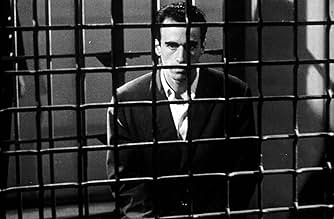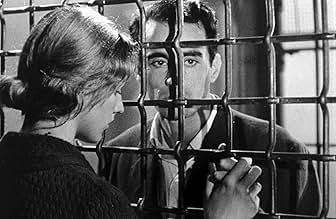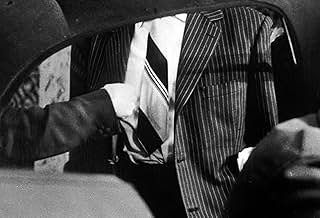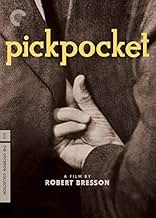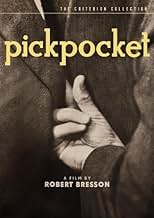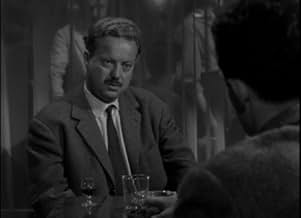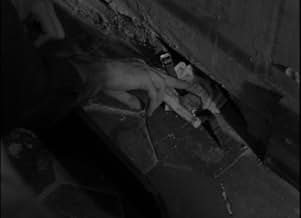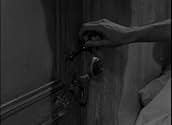Pickpocket
- 1959
- Tous publics
- 1h 16m
IMDb RATING
7.6/10
27K
YOUR RATING
Michel passes the time by picking pockets, careful to never be caught despite being watched by the police. His friend Jacques may suspect, while both men may have their eyes on Jeanne, the p... Read allMichel passes the time by picking pockets, careful to never be caught despite being watched by the police. His friend Jacques may suspect, while both men may have their eyes on Jeanne, the pretty neighbor of Michel's ailing mother.Michel passes the time by picking pockets, careful to never be caught despite being watched by the police. His friend Jacques may suspect, while both men may have their eyes on Jeanne, the pretty neighbor of Michel's ailing mother.
- Awards
- 3 nominations total
- Director
- Writer
- All cast & crew
- Production, box office & more at IMDbPro
Featured reviews
Pickpocket is a film that apparently has serious flaws- from the very beginning it displays little to no emotion as the actors on screen just say their lines and the camera just follows them from a distance, with no close-ups or any other tricks.
But what is unique about this film is that this very criticism is actually a deliberate attempt to cause uneasiness in the viewer. And it succeeds- the anxiety, as felt by the pickpocket in his everyday living, is also transmitted to us. So, to correct my previous statement: this movie does not lack emotions- it has emotions: anxiety, uncertainty, but these are delivered in an unconventional manner.
From a personal standpoint, I wasn't sure if I liked it or not. It is hard to appreciate this dimension of the film at first. But after seeing some extras from the excellent Criterion package, I was able to understand better. How Bresson actually committed to cause these emotions in the viewer, how he re-shot several times various scenes until the actors just repeated their lines, until no trait of emotions were left. Michel's narration voice-over is flat, plain. These were non-professional actors set to work in a non-standard way, Bresson's way. And the result is this: a film somewhat off-putting, but still a great work of art.
But what is unique about this film is that this very criticism is actually a deliberate attempt to cause uneasiness in the viewer. And it succeeds- the anxiety, as felt by the pickpocket in his everyday living, is also transmitted to us. So, to correct my previous statement: this movie does not lack emotions- it has emotions: anxiety, uncertainty, but these are delivered in an unconventional manner.
From a personal standpoint, I wasn't sure if I liked it or not. It is hard to appreciate this dimension of the film at first. But after seeing some extras from the excellent Criterion package, I was able to understand better. How Bresson actually committed to cause these emotions in the viewer, how he re-shot several times various scenes until the actors just repeated their lines, until no trait of emotions were left. Michel's narration voice-over is flat, plain. These were non-professional actors set to work in a non-standard way, Bresson's way. And the result is this: a film somewhat off-putting, but still a great work of art.
A remarkable film even though the ending is anti-climactic. An amateur pickpocket gets lucky and meets Kassagi, the real-life pickpocket who served as the film's technical consultant. The most amazing scene is the one where three pickpockets rob one passenger after another on a train, taking wallets, passing them off to each other, then emptying and dumping them (or in one case, neatly replacing the lightened wallet in a man's pocket!). The light-finger techniques seem more or less authentic, although I imagine the director's script might have called for inauthentic bits of business. (No, I am not a pickpocket; I was a mark once, and they really messed up my life for a couple of days, but I have been fascinated ever since.)
The pickpockets in this movie follow the European style of stealing men's wallets practically face-to-face. (American pickpockets traditionally prefer to steal from behind to avoid any chance of a mark seeing their faces. When I was taken, I never saw, heard or felt anything.)
LaSalle as Michel is deadpan, but that seems to be part of his character. Now and again, he bubbles a little with suppressed feeling, mostly anger. His passion for Jeanne (Marika Green) is so completely submerged that it does not come out until the end. (If you think I'm spoiling anything, you will want to skip the on screen legend that opens the film because it gives away even more.) As a love story, this does not work. I get it, though: Something happened before the film begins that makes Michel extremely ashamed. He can't be with his mother or anyone he cares about because of his guilt.
The pickpockets in this movie follow the European style of stealing men's wallets practically face-to-face. (American pickpockets traditionally prefer to steal from behind to avoid any chance of a mark seeing their faces. When I was taken, I never saw, heard or felt anything.)
LaSalle as Michel is deadpan, but that seems to be part of his character. Now and again, he bubbles a little with suppressed feeling, mostly anger. His passion for Jeanne (Marika Green) is so completely submerged that it does not come out until the end. (If you think I'm spoiling anything, you will want to skip the on screen legend that opens the film because it gives away even more.) As a love story, this does not work. I get it, though: Something happened before the film begins that makes Michel extremely ashamed. He can't be with his mother or anyone he cares about because of his guilt.
In his dismissal determination to keep out elements often thought fundamental to the mediumspectacle, drama, performance Bresson has followed an incomparable personal vision of the world that stays consistent whatever the nature of his subject matter...
In "Pickpocket," a petty thief understands life's mystery only when his conventional wisdom is violently shaken and embraces humanity through his newfound love Most notable, however, is not the emphasis upon redemption attained through communication and self-sacrifice, but the high-purity of Bresson's style...
The camera keeps out pictorial beauty to create an abstract timeless world through the detached, detailed observation of hands, faces, and objects; natural sounds rather than music to satisfy the need In thus rejecting conventional realism and characterization, Bresson manifested a fascination not with human psychology but with the capacity of the soul to survive in a world of pain, disbelieve, and restriction...
In "Pickpocket," a petty thief understands life's mystery only when his conventional wisdom is violently shaken and embraces humanity through his newfound love Most notable, however, is not the emphasis upon redemption attained through communication and self-sacrifice, but the high-purity of Bresson's style...
The camera keeps out pictorial beauty to create an abstract timeless world through the detached, detailed observation of hands, faces, and objects; natural sounds rather than music to satisfy the need In thus rejecting conventional realism and characterization, Bresson manifested a fascination not with human psychology but with the capacity of the soul to survive in a world of pain, disbelieve, and restriction...
To my previous comments, I should like to add/correct. When I said that Kassagi, who plays "first accomplice" (1er complice), was a 'real-life pickpocket who served as the film's technical consultant' I was not only inaccurate, but the fact that Kassagi was actually a stage magician has some bearing on the film itself, for although the scene in which the pickpockets rip off a series of train passengers is authentic in that it shows how pickpockets operate in terms of teamwork and speed, nevertheless, the moment when Kassagi (?) 'neatly replac[es] the lightened wallet [back] in a man's pocket' is not something a real pickpocket would likely do; it is, however, exactly what a stage magician would do. A real pickpocket has no audience (or so he hopes) whereas a magician wants the audience to see him make a monkey of the hapless "volunteer from the audience." In this case, Kassagi's idea (as I am sure it was) provides a brief moment of comic relief in the middle of a movie that is otherwise without a lot of humor. It is a welcome touch and Bresson was wise to keep it in. Now, I also engaged in a fallacy when I said that 'American pickpockets traditionally prefer to steal from behind to avoid any chance of a mark seeing their faces.' In reality, American pickpockets take from behind because of necessity: even by 1959 when 'Pickpocket" was released, American men more and more carried their wallets in the hip pocket whereas European men, as can be seen in this film, continued to use the inside breast pocket. While the business about seeing the mark's face is part of the lore of American petty criminals, it is not the cause of the American style of picking pockets, but rather a rationalization after the fact.
Probably the most influential of Robert Bresson's trio of masterpieces from the Fifties (the other two being *A Man Escaped* and, of course, *Diary of a Country Priest*). *Pickpocket* sowed its seeds of influence in the minds of any number of film artists -- Jean-Pierre Melville most notably (who despised Bresson, apparently), whose *Le Samourai* was a mighty struggle against this film . . . and, most completely, writer-director Paul Schrader, who, you'll recall, wrote the *Taxi Driver* screenplay, which was another story about a loner on the outside of societal norms. And it goes without saying that Schrader's *American Gigolo*, which he also directed, is a virtual rewrite of *Pickpocket*, right down to the egregiously plagiarized finale.
The subject of Bresson's film is not nearly as sexy a conception as Schrader's gigolo, though the milieu is equally as sleazy. Instead of preening Richard Gere, we get acting novice Martin LaSalle as the Pickpocket, who wears one suit through the entire film. (Schrader obviously thought he was being clever by giving Gere a large closet stuffed with designer suits). LaSalle lives in a crumbly walk-up flat in Paris, where his books gather dust and the baseboards hide his humble stash of francs and the occasional wristwatch. He has few friends and is too ashamed to visit his dying mother (I won't spoil the reason why). The only pleasure he derives is from his compulsive work as a pickpocket, and it is in these scenes that Bresson stuns us with his martinet control of both narrative pacing and camera placement. The director lovingly shows us the subtle skills of the street thief: the creeping hands, the split-second scams (such as lifting a wallet from a man's suit breast-pocket while standing next to him and pretending to read a newspaper), the choreographed celerity of movement when the thief works with his partners in crime. There's one sequence that follows LaSalle and his two accomplices from a train station all the way to the train, in which they lift about 15 wallets and the occasional purse. The camera-work and editing here is nothing less than sheer mastery -- a ballet of thievery. And let it also be said that Bresson is no slouch when it comes to suspense. It's an intimate and sweaty suspense: will LaSalle's fingers, as they slowly reach into a purse, be noticed?
As might be expected from a French director of the period, there's also plenty of philosophizing to be found here, and in this case, the philosophy is actually pretty interesting. The movie takes as its intellectual parents the ubermensch riff by Nietzsche and Dostoyevsky's "Crime and Punishment". LaSalle asks the cop who's on his trail if society's "supermen", even if they choose to be thieves, should not only be let alone, but even respected as an overall benefit to society. (Thus sprach Kenneth Lay!) Obviously, we can mull that over ourselves, but in the meantime, Bresson is not particularly impressed with the "decent" elements of society. The cop is a pompous blow-hard who can offer LaSalle no alternative to his criminality. Bresson is more or less saying that modern society is contemptible: your acceptance of that thesis, and the importance you place on the occasional 100 francs getting lifted from an overfed bourgeois, will ultimately determine your acceptance of this film.
But perhaps its style will bog you down. As per usual, Bresson breaks virtually every rule of the movies. The use of non-actors in the main roles engenders both assets and liabilities: while the avoidance of the typical actors' nonsense is a definite asset, the liabilities occur when Bresson asks his "interpreters" to finally, well, act. There are a few scenes here where the incompetence of LaSalle (he eventually became a fine actor, but he was virtually plucked off the street by Bresson in 1958) will make you cringe, especially when LaSalle is supposed to be angry with someone. There IS something to be said for professionals -- even professional actors. And if none of this puts you off, perhaps Bresson's perverse narrative style -- including scenes in which a character writes down on a piece of paper the following narrative action, to be followed by the character READING what he has just written down, and climaxed by the character DOING just what he wrote and said he was going to do -- will make you scratch your head and mutter something about the arty pretensions of French directors.
And your comments would certainly be justified in Bresson's later productions. But in *Pickpocket*, I feel, the narrative precision, lack of bloat (the movie is 75 minutes long), and broader philosophical questions coalesce into a stringent masterpiece that must finally win your respect. Besides: you gotta love a movie about a pickpocket who never bothers to lock, or even close, his own front door. See? Bresson can even be funny.
8 stars out of 10.
The subject of Bresson's film is not nearly as sexy a conception as Schrader's gigolo, though the milieu is equally as sleazy. Instead of preening Richard Gere, we get acting novice Martin LaSalle as the Pickpocket, who wears one suit through the entire film. (Schrader obviously thought he was being clever by giving Gere a large closet stuffed with designer suits). LaSalle lives in a crumbly walk-up flat in Paris, where his books gather dust and the baseboards hide his humble stash of francs and the occasional wristwatch. He has few friends and is too ashamed to visit his dying mother (I won't spoil the reason why). The only pleasure he derives is from his compulsive work as a pickpocket, and it is in these scenes that Bresson stuns us with his martinet control of both narrative pacing and camera placement. The director lovingly shows us the subtle skills of the street thief: the creeping hands, the split-second scams (such as lifting a wallet from a man's suit breast-pocket while standing next to him and pretending to read a newspaper), the choreographed celerity of movement when the thief works with his partners in crime. There's one sequence that follows LaSalle and his two accomplices from a train station all the way to the train, in which they lift about 15 wallets and the occasional purse. The camera-work and editing here is nothing less than sheer mastery -- a ballet of thievery. And let it also be said that Bresson is no slouch when it comes to suspense. It's an intimate and sweaty suspense: will LaSalle's fingers, as they slowly reach into a purse, be noticed?
As might be expected from a French director of the period, there's also plenty of philosophizing to be found here, and in this case, the philosophy is actually pretty interesting. The movie takes as its intellectual parents the ubermensch riff by Nietzsche and Dostoyevsky's "Crime and Punishment". LaSalle asks the cop who's on his trail if society's "supermen", even if they choose to be thieves, should not only be let alone, but even respected as an overall benefit to society. (Thus sprach Kenneth Lay!) Obviously, we can mull that over ourselves, but in the meantime, Bresson is not particularly impressed with the "decent" elements of society. The cop is a pompous blow-hard who can offer LaSalle no alternative to his criminality. Bresson is more or less saying that modern society is contemptible: your acceptance of that thesis, and the importance you place on the occasional 100 francs getting lifted from an overfed bourgeois, will ultimately determine your acceptance of this film.
But perhaps its style will bog you down. As per usual, Bresson breaks virtually every rule of the movies. The use of non-actors in the main roles engenders both assets and liabilities: while the avoidance of the typical actors' nonsense is a definite asset, the liabilities occur when Bresson asks his "interpreters" to finally, well, act. There are a few scenes here where the incompetence of LaSalle (he eventually became a fine actor, but he was virtually plucked off the street by Bresson in 1958) will make you cringe, especially when LaSalle is supposed to be angry with someone. There IS something to be said for professionals -- even professional actors. And if none of this puts you off, perhaps Bresson's perverse narrative style -- including scenes in which a character writes down on a piece of paper the following narrative action, to be followed by the character READING what he has just written down, and climaxed by the character DOING just what he wrote and said he was going to do -- will make you scratch your head and mutter something about the arty pretensions of French directors.
And your comments would certainly be justified in Bresson's later productions. But in *Pickpocket*, I feel, the narrative precision, lack of bloat (the movie is 75 minutes long), and broader philosophical questions coalesce into a stringent masterpiece that must finally win your respect. Besides: you gotta love a movie about a pickpocket who never bothers to lock, or even close, his own front door. See? Bresson can even be funny.
8 stars out of 10.
Did you know
- TriviaBanned in Finland until 1965 because of its depiction of authentic pickpocketing techniques.
- ConnectionsEdited into Histoire(s) du cinéma: Une histoire seule (1989)
- SoundtracksSuite de symphonies d'Amadis (selection)
(uncredited)
Music by Jean-Baptiste Lully (as J.B. Lulli)
Éditions Transatlantiques
- How long is Pickpocket?Powered by Alexa
Details
Box office
- Gross worldwide
- $7,541
- Runtime1 hour 16 minutes
- Color
- Aspect ratio
- 1.37 : 1
Contribute to this page
Suggest an edit or add missing content



